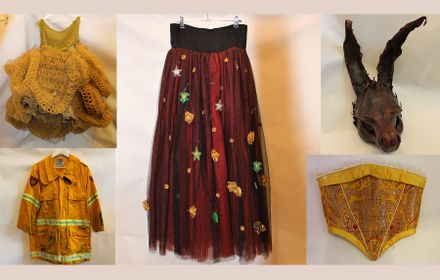
General
For the apparel oft proclaims the man
26 May 2021


Susan Pugh was introduced to Shakespeare by an enthusiastic Year 9 teacher and an opportunity to perform as Hermia in her school production of A Midsummer Night’s Dream. She loves Shakespeare’s ability to capture the human experience and remain relevant 400 years after his death. Sue and her husband Michael Bennett have been following Bell Shakespeare‘s work since 1996. We spoke to Sue about why she supports the Company.
1. Can you tell us a little bit about you?
I’ve called Australia home for the last 31 years. I was born in England and completed all my education in the UK. I came to Australia because my husband Mike was Australian – we met at work and got married in England before moving to Australia at the end of ’89. I have been working as a GP in Paddington for the last 30 years.
The move to Australia took very little convincing and is a decision I have never regretted. I’d been looking for a way to get out of England for some time and so Mike was the perfect foil. Of course, I must stress we are still together and still in love – he was not just a pawn in my migration plans!
2. What was your first experience with Shakespeare?
I had always enjoyed Drama at school. When I reached Year 9 we were introduced to Shakespeare by a particularly good English teacher. Because I already loved drama, I really embraced Shakespeare.
This teacher made sure we performed Shakespeare rather than just reading aloud in that dull, horrible fashion. I thought it was fantastic, I loved the language, and the way Shakespeare captures humanity and the human condition. That was the beginning of a long-lasting appreciation of the work.
In the same year, our school put on a production of A Midsummer Night’s Dream and I was cast in the role of Hermia. Not long after this performance, we went to the Royal Shakespeare Company in Stratford-upon-Avon to see their production of A Midsummer Night’s Dream. From memory, Zoë Wanamaker played Hermia, and I can humbly say she did a much better job of the role than me. I will happily hand over that praise.
3. How did you come to engage with Bell Shakespeare?
Curiously it was Stephen Berkoff that brought us into the Bell Shakespeare audience. Mike and I had followed his work in the UK. In 1996 we found out he was doing a production of Coriolanus. This was certainly a noteworthy production; if you have listened to John Bell’s episode of Speak the Speech you would have heard how he considered Berkoff an interesting person to collaborate with.
We have been to almost every one of Bell Shakespeare productions since!
4. What has been your favourite Bell Shakespeare production and why?
You can’t go past Kate Mulvany in Peter Evans’ Richard 3. I’ve loved all the comedies; The Comedy of Errors and The Servant of Two Masters (not Shakespeare but part of the canon!). I also appreciated the all-female cast of The Taming of the Shrew, a tactful way of getting around the misogyny of the play.
One production that has always stood out to me was the 2010 production of Twelfth Night directed by Lee Lewis. I loved it because the setting was so iconically Australian; sheltering from a bushfire. There was a pile of clothing in the centre of the stage from which the actors would pluck out their costumes and play their parts.
Lee Lewis had proposed this production to John Bell with only eight actors, which John doubted was possible. This casting resulted in one actor having to have a fight with himself, half dressed in each costume. It was pure magic and so inspiring.
5. Why do you support Bell Shakespeare?
Firstly, I am just a big fan of Shakespeare and believe it needs to be performed to be appreciated. People say it’s too difficult and the language is problematic but that’s untrue; when it’s performed meaning can be conveyed easily.
One of the main reasons I support Bell Shakespeare is because of their education work, programs such as the Regional Teacher Mentorship which helps teachers to teach Shakespeare better, or the Juvenile Justice program which is transformative.
6. What excites you about the future of the Company?
I am excited by the passion of the whole organisation to continue John Bell’s vision, the commitment to both education and live performance, Peter Evans’ work as Artistic Director and the collaboration with other artists and directors coming into the Company. Everybody that I’ve met in the organisation is really passionate about the work they do. I cannot wait to see what comes out of the company over the next 30 years and beyond.
No matter how many years go by, Shakespeare is adaptable to whatever era you are living in. As John Bell says it is the ambiguity in the plays that allows for endless interpretation. Shakespeare does not tell you what to think; the writing allows you to consider all sorts of perspectives.
If you would like to share your story about what moves you to support Bell Shakespeare, we would love to hear from you. Email together@bellshakespeare.com.au
If you enjoyed hearing Susan’s reflections on Shakespeare, don’t forget to book your tickets to our upcoming production of A Midsummer Night’s Dream.